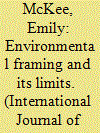| Srl | Item |
| 1 |
ID:
161167


|
|
|
|
|
| Summary/Abstract |
As activists frame campaigns, their region's broader cultural and political context intercedes. In Israel and Palestine attempts to work across national lines and undertake activism that links ecological, economic, and social issues have long been stymied. This article examines how the fraught historical and contemporary relationships of Israelis and Palestinians with land bestow both flexibility and limitations on their framing of campaigns. In particular, it ethnographically analyzes the framing of two projects—the building of an “eco-mosque” and a Jordan River restoration effort—to examine how activists grapple with frame flexibility and its limits. It finds that an Israeli tendency to deterritorialize environmental issues and curb environmental campaigns that are “too political” conflicts with Palestinian criticism of apolitical frames because they euphemize violence and domination. These cases demonstrate how local connotations can make or break environmental campaigns. The eco-adage, “Think global, act local” is not enough. One must think local, too.
|
|
|
|
|
|
|
|
|
|
|
|
|
|
|
|
| 2 |
ID:
189547


|
|
|
|
|
| Summary/Abstract |
Expanding on political ecology analyses that are increasingly applied to water-related challenges, this essay calls for greater attention to the political and social consequences of proposed water solutions. Concern about environmental health in Palestine often highlights a lack of water access, with proposed solutions focusing on increasing water supplies. Drawing on fieldwork in the West Bank, northern Israel, and Tel Aviv, this essay compares how differently situated residents and water managers evaluate the potential impacts of one type of supply-side infrastructure: desalination. This comparison counters avowedly apolitical technical evaluations of such initiatives by showing uneven sociopolitical costs and benefits.
|
|
|
|
|
|
|
|
|
|
|
|
|
|
|
|